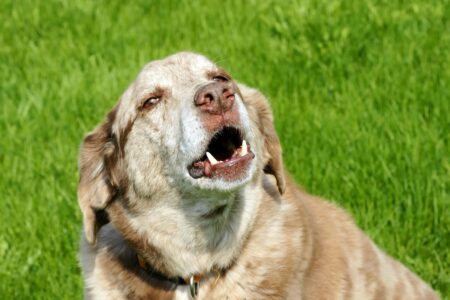
Dog Makes Grunting Noises When Sleeping: Causes and Solutions
Has your dog been making unusual grunting noises while they’re snoozing away? It can be concerning to hear your dog grunting and snorting in their sleep, but don’t worry! There are many reasons why this might be happening, from perfectly normal causes to those that may require a bit of attention. In this article, we will explain some of the reasons why your dog might be making those peculiar noises and what you can do to help.
SEE ALSO: Dog Walking Tips for Less Than Perfect Weather Conditions
Dog Makes Grunting Noises When Sleeping: Causes
Here are some potential causes of grunting noises when your dog is sleeping:
1. Snoring:
This is the most common cause of grunting noises in sleeping dogs. It occurs when airflow is obstructed during sleep, causing loud, harsh noises.
2. Sleep Apnea:
Similar to humans, sleep apnea in dogs is characterized by brief interruptions in breathing during sleep, resulting in loud snorts, gasps, or even silence.
3. Reverse Sneezing:
Also known as pharyngeal gag reflex, this condition causes dogs to suddenly gasp or snort repeatedly.
4. Congestion:
If your dog is suffering from a cold, flu, or allergies, they may experience congestion in their airways, which can result in grunting or snoring during sleep.
5. Allergies:
Environmental allergens, such as pollen, dust, or mold, can cause inflammation and irritation in your dog’s respiratory tract, leading to noisy breathing during sleep.
6. Obesity:
Excess weight can put pressure on your dog’s airways, making it difficult to breathe normally and resulting in snoring or grunting.
7. Nasal obstructions:
Foreign objects, like grass seeds or small toys, can become lodged in a dog’s nasal passages, causing grunting or snorting during sleep.
8. Tracheal Collapse:
This condition occurs when the trachea (windpipe) becomes weak and collapses, making it difficult for dogs to breathe and causing grunting or wheezing.
9. Respiratory Infections:
Diseases like kennel cough or pneumonia can cause respiratory distress in dogs, resulting in grunting or coughing during sleep.
10. Congenital Conditions:
Some dogs may be born with anatomical abnormalities, such as an elongated soft palate or stenotic nares (narrowed nostrils), which can lead to obstructions and breathing difficulties during sleep.
11. Age:
Older dogs may experience age-related breathing difficulties, such as laryngeal paralysis, which can cause grunting or snoring during sleep.
How Can You Tell If Your Dog is Making Noises in His Sleep or Just Dreaming?
It can be tricky to differentiate between dream noises and snoring. Here are a few ways to tell the difference:
- Snoring is often consistent and rhythmic, while dream noises are usually more sporadic and random.
- Snoring tends to sound more like a harsh, raspy noise, while dream noises can vary from whimpers to barks.
- Dreaming dogs usually exhibit other signs of dreaming, such as leg twitching, tail wagging, or running in place.
If you’re still unsure whether your dog is snoring or dreaming, there are a few things you can do:
- Watch your dog closely: If your dog is dreaming, they’ll usually settle down after a few minutes.
- Keep a sleep diary: Note the times when your dog is making noises and whether they seem to be in a deep sleep or light sleep.
- Consider using a recording device: If you’re still unsure, try recording your dog while they sleep and play the recording back later to identify any patterns.
Dog Making Grunting Noises When Breathing
Dogs may grunt while breathing if they’re experiencing respiratory issues or allergies. Here are a few common causes:
- Congestion: If your dog has a cold or allergies, they may have congestion in their airways, causing grunting.
- Nasal obstructions: Foreign objects, like grass seeds or small toys, can become lodged in a dog’s nasal passages, causing grunting.
- Allergies: If your dog is allergic to something in their environment, like dust mites or pollen, they may have inflammation in their airways, leading to grunting.
Why is My Dog Groaning All of A Sudden?
Your dog may be groaning all of a sudden for a variety of reasons:
- Pain or Discomfort: Groaning could be a sign of discomfort or pain, especially if the groaning occurs when your dog is lying down or getting up from a resting position.
- Arthritis or Joint Issues: Senior dogs or those with arthritis may groan when they move due to stiffness or pain in their joints.
- Digestive Issues: If your dog is groaning after eating, it may be a sign of indigestion or other digestive issues, such as a stomach ache.
- Anxiety or Stress: Dogs may groan as a way to release tension or anxiety, especially if there have been recent changes in their environment or routine.
- Attention Seeking: Some dogs may groan to get your attention, especially if they know that they will receive a reward or petting.
- Illness: Groaning may be a sign of illness or disease, especially if it’s accompanied by other symptoms, like vomiting, diarrhea, or lethargy.
- Sleep Disturbance: Groaning while sleeping could be a sign of sleep apnea or other sleep disorders, which can be common in dogs.
- Urinary Tract Infection: Groaning may be a sign of discomfort or pain associated with a urinary tract infection, which can be caused by bacteria or other issues.
- Separation Anxiety: Groaning may be a way for dogs to cope with separation anxiety, especially if they are left alone for long periods or have recently experienced a change in their environment.
Why Does My Dog Groan When I Cuddle Him?
There are a few potential reasons why your dog groans when you cuddle him:
- Affection and Bonding: Groaning can be a sign of affection or bonding, similar to the way humans might moan or sigh when they’re feeling comfortable or content.
- Aversion to Cuddling: Some dogs may not enjoy being cuddled or held, and may groan or squirm to express their discomfort.
- Pain or Discomfort: Groaning while cuddling may be a sign of pain or discomfort, especially if your dog is reluctant to be touched or handled in certain areas.
- Dominance Display: Groaning while being cuddled could be a subtle way for your dog to assert dominance or challenge your authority. This is more common in dogs who haven’t been trained or socialized properly.
- Medical Issues: Groaning may be a sign of a medical issue, such as arthritis or joint pain, which can cause discomfort when your dog is held or cuddled
- Hunger or Thirst: If your dog groans when you cuddle him, it may be a sign that he’s hungry or thirsty, especially if he hasn’t eaten or had water recently.
Senior Dog Groans a Lot
As dogs age, they may experience several changes in their health and behavior, including increased groaning. Here are some possible reasons why senior dogs may groan more:
- Pain or Discomfort: As dogs age, they may develop arthritis, joint pain, or other medical conditions that cause discomfort and make them more likely to groan or vocalize when they move or are touched.
- Cognitive Decline: Senior dogs may experience cognitive decline, which can cause confusion, disorientation, and increased vocalization, including groaning or barking.
What Can You Do to Help Your Dog Stop Making These Grunting Noises When Sleeping? (Solutions)
Here are some steps you can take to help your dog stop making grunting noises while sleeping:
1. Change Sleeping Position:
Encourage your dog to sleep on their side or stomach, which can help reduce snoring and other respiratory issues.
2. Clear Nasal Passages:
If your dog’s grunting is caused by congestion or nasal obstructions, use a saline solution or a humidifier to clear their nasal passages.
3. Lose Weight:
If your dog is overweight, helping them lose weight can reduce pressure on their airways and reduce snoring and grunting.
4. Keep Bed Area Clean:
Make sure to regularly clean your dog’s bedding, as dust and other allergens can contribute to snoring and grunting.
5. Check for Medical Issues:
If the grunting persists, consult with a veterinarian to rule out any underlying medical issues, such as sleep apnea, respiratory infections, or arthritis.
6. Use a White Noise Machine:
A white noise machine can mask the grunting noises and help both you and your dog get a better night’s sleep.
7. Avoid Feeding Close to Bedtime:
Feeding your dog too close to bedtime can lead to digestive issues that can cause grunting or groaning.
8. Regular Exercise:
Regular exercise can help improve your dog’s overall health and respiratory function, which can reduce snoring and grunting.
9. Monitor Temperature and Humidity:
Keeping your home at a comfortable temperature and humidity can also help reduce snoring and grunting in dogs.
SEE ALSO: Reasons Why Dogs Are Cleaner than Human
FAQs
Q. What causes a dog to grunt?
Common causes of grunting in dogs include respiratory issues, pain or discomfort, cognitive decline, and digestive problems.
Q. What to do if your dog is making weird noises while sleeping?
If your dog is making weird noises while sleeping, monitor their behavior and seek veterinary care if the noises persist or are accompanied by other symptoms.
Q. Why does my dog grunt and sigh when lying down?
Your dog may grunt and sigh when lying down due to discomfort, exhaustion, or a desire for attention.


